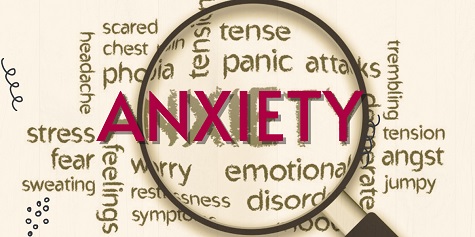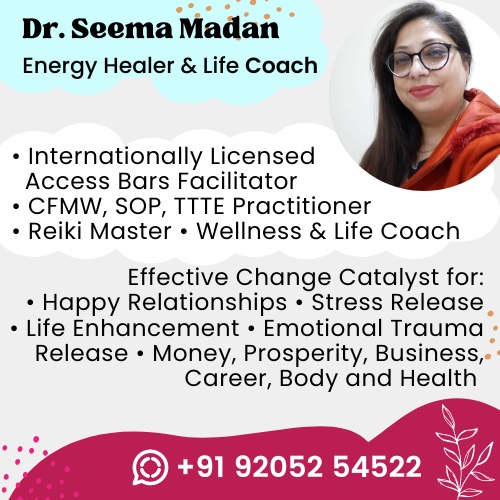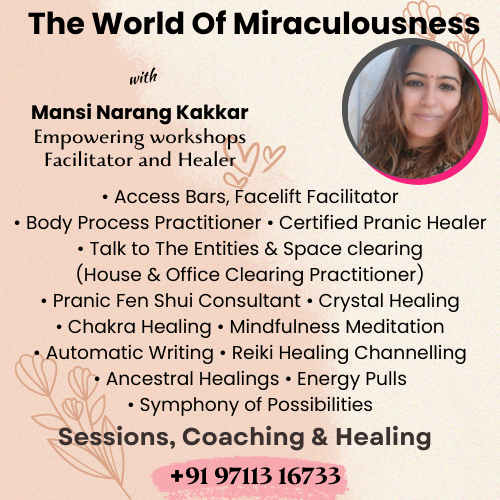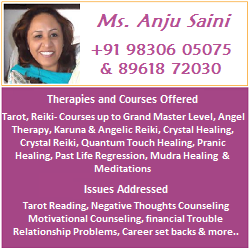Alternative Therapies
- Alternative Medicine
- Access Bars
- Access Consciousness
- Access Body Processes
- Access Energetic Faclift 0
- Acupressure
- Acupuncture
- Ancient Magnetism
- Angel Healing
- Ayurveda
- Bach Flower Remedies
- Breathwork
- Cosmetic Acupuncture
- Crystal Healing
- Cupping Therapy
- Emotional Freedom Technique (EFT)
- Ergonomics
- Fengshui
- Holistic Solutions
- Holy Fire Reiki
- Homeopathy
- Hypnotherapy
- Inner Child Therapy
- Jikiden Reiki
- Lama Fera
- Life Coaching
- Manual Therapy
- Meditation
- Melchizedek Method
- Motivational Counselling
- Mudra Healing
- Nakshatra Energies
- Naturopathy
- Neuro Linguistic Programming (NLP)
- Panchakarma (Ayurveda)
- Past Life Regression
- Physiotherapy
- Pranic Healing
- Pyramids
- Quantum Jumping Meditation
- Quantum Touch Healing
- Reiki
- Rudraksh
- Silva Mind Control Method
- Sujok therapy
- Tarot
- Theta Healing
- Unani Medicine
- Yoga
Diseases & Conditions
- Acne & Pimples
- Allergies
- Arthritis
- Asthma
- Behavioural Disorders
- Dandruff
- Diabetes
- Emotional Problems
- Gallstones
- Gastritis
- Hairloss
- Heart Diseases
- Hormonal Problems
- Hypertension
- Immune Disorders
- Infections
- Infertility
- Jaundice
- Kidney Disorders
- Liver Disorders
- Menstrual Disorders
- Migraine
- Neck & Back Pain
- Obesity
- Osteoporosis
- Peptic Ulcer
- Prevention
- Prostate Problems
- Psoriasis
- Sexual Dysfunctions
- Sinusitis
- Sleep Disorders
- Skin Diseases
- Stress
- Thyroid Disorders
- Ulcerative Colitis
- Urinary Infections
General Wellness
Anxiety Counselling in Mauritius
Dr. Seema Madan

Dr Seema Madan is an Internationally Licensed Access Bars Facilitator, CFMW, SOP Practitioner, TTTE Practitioner, Reiki master and a wellness and life coach...

The World Of Miraculousness with Mansi Narang Kakkar

Mansi Narang Kakkar is an Access Consciousness Bars N Facelift Facilitator And Practitioner, A Certified Pranic Healer, Talk to the Entities Practitioner, Body Process practitioner, Symphony of Possibilities Practitioner, Reiki Healer, A Psychic n a medium.

Cosmicx Healing Art - Ms. KripaJyoti Nisha Singla

KripaJyoti Nisha Singla (PGDBM) is a Spiritual master, Energy worker, Reiki Master, Theta Instructor, and a dedicated Artist who has been working in the field of healings, spirituality, counselling, relationship healing, family therapy and alternative medicine therapies from more than 12 years.

Ace Tarot - Ms. Anju Saini

Anju Saini acknowledged as internationally known psychic, whose work as a teacher and reader has established her firmly as an expert in many paranormal fields. She has been reading the Tarot from a decade and is considered to be one of the Brilliant Tarot Reader and Counselor, known for an excellent grip over the art of Tarot Cards Reading and trainings, Reiki Healing and Quantum touch classes.

ANXIETY DISORDERS

Anxious behavior befalls us all at one time or another, yet it doesn't have to be an ongoing issue. Many stress-relievers exist to bring our nerves back into alignment again, so lets take a look at how our nervous system handles anxiety, and how we can use a few home remedies for anxiety to calm down a bit.
Quashing the Quivers
Everyone experiences anxiety at some point in their lives. Perhaps you're sitting in your doctor's waiting room, anticipating the horse-sized needle your doctor has waiting for you on the other side of the door. Or maybe you've spent all day cooking, but the look on your mother-in-law's face says your best efforts were wasted. Or maybe you really hate your job.
These very different experiences can bring on anxiety and its various symptoms:
- heart palpitations
- sense of impending doom
- inability to concentrate
- muscle tension
- dry mouth
- sweating
- queasy, jittery feeling in the pit of the stomach
- hyperventilation
- Hyperthyroidism, which may produce symptoms that resemble those of anxiety
- Heart disorders, which can cause rapid heartbeat, often associated with anxiety
- Caffeine, which can produce nervous symptoms even in moderate amounts
- Premenstrual syndrome (PMS)
- Diet pills
- Anemia
- Diabetes
- Hypoglycemia
Anxiety can be short- or long-lived, depending on its source. The more long lasting the anxiety, the more additional symptoms you will experience.
If your anxiety is a reaction to a single, isolated event -- the shot the doctor is about to give you, for example -- your anxiety level will decrease and your symptoms will disappear after the event. If your anxiety is caused by friction between you and your mother-in-law, you're likely to experience anxiety for a period of time before and after you see her. In this case, the symptom list may have grown to include diarrhea or constipation and irritability.
Then there's that job, a source of anxiety that never leaves you. You dread getting up in the morning because you have to go to work, dread going to bed at night because when you wake up you have to go to work, dread the weekend because when it's over you'll have to go to work. When the source of your anxiety is always present, you may also experience the following symptoms: chest pain, over- or under-eating, insomnia, loss of sex drive. All three situations described above are types of everyday anxiety. But even though such anxiety may be common, it's taking its toll on you, physically, mentally, and emotionally.
What Causes Anxiety?
Essentially, anxiety is part of the "fight or flight" mechanism, a carryover from our ancient ancestors. They were hunters, but they also were the hunted; their instincts readied them to attack -- or run from an attack. Anxiety kept them alive, as it caused adrenaline to be released into the bloodstream. When that big ol' bear was breathing down our ancestor's neck, his adrenaline surged as a warning, causing his liver to release energy-stimulating sugars into his system to ready him for the fight.
That warning system is still necessary for today's emergencies. Trouble is, we experience the manifestations of the "fight or flight" mechanism even when it's not really appropriate to our modern stressors. You could run from your job or your doctor, and you could physically fight your mother-in-law, but the results would not be as helpful for you as they were when that ancestor outran a lion or knocked out a bear!
Certainly, your mother-in-law's visit may not be pleasant, but it's not life threatening either. You may feel your muscles knot up at the very mention of her name, but that, in itself, isn't a problem -- the problem is the body's response to such stress. When anxiety is severe or prolonged, the powerful "fight or flight" chemicals can damage your body's organs. Eventually, anxiety can cause a full-fledged illness, such as headaches and high blood pressure.
While stress is most often at the root of anxiety symptoms, they can be caused by physical problems as well. If your anxiety symptoms are persistent, get checked out by your doctor so that you can rule out the following:
So now that you know what anxiety can do, it's time to learn what you can do to control it. Mild anxiety can be treated successfully at home with a little calming music, a little quiet time, and some soothing remedies from the kitchen. Take a look at the next page for a few home remedies you can implement to easily reduce your anxiety






